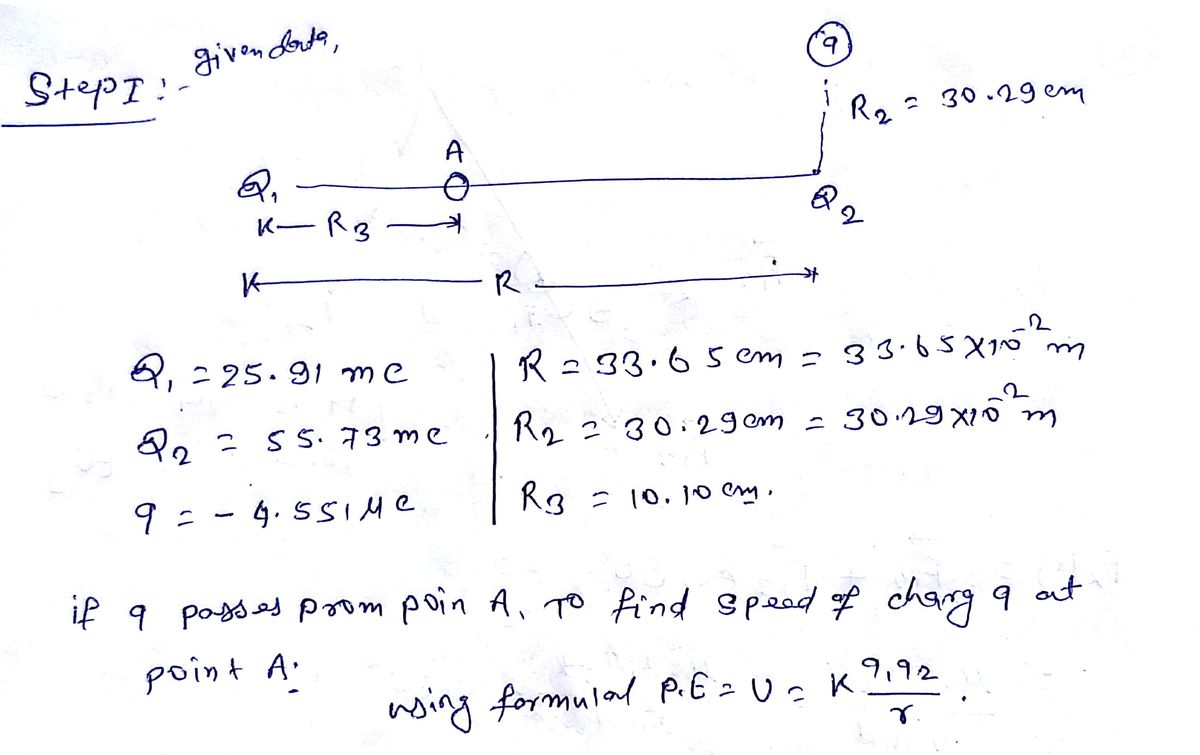Charge Q1 = 25.91 mC is placed R = 33.65 cm to the left of charge Q2 = 55.73 mC, as shown in the figure. Both charges are held stationary. Point A is located R3 = 10.10 cm to the R. right of Q1. A particle with a charge of q = -4.551 µC and a mass of A 19.81 g is placed at rest at a distance R2 = 30.29 cm above Q2. If the particle were to be released from rest, calculating -R its exact path would be a challenging problem. However, it is possible to make some definite predictions about the future motion of the particle If the path of the particle were to pass through point A, what would be its speed va at that point? VA = m/s
Charge Q1 = 25.91 mC is placed R = 33.65 cm to the left of charge Q2 = 55.73 mC, as shown in the figure. Both charges are held stationary. Point A is located R3 = 10.10 cm to the R. right of Q1. A particle with a charge of q = -4.551 µC and a mass of A 19.81 g is placed at rest at a distance R2 = 30.29 cm above Q2. If the particle were to be released from rest, calculating -R its exact path would be a challenging problem. However, it is possible to make some definite predictions about the future motion of the particle If the path of the particle were to pass through point A, what would be its speed va at that point? VA = m/s
College Physics
10th Edition
ISBN:9781285737027
Author:Raymond A. Serway, Chris Vuille
Publisher:Raymond A. Serway, Chris Vuille
Chapter16: Electrical Energy And Capacitance
Section: Chapter Questions
Problem 19P: A proton is located at the origin, and a second proton is located on the x-axis at x = 6.00 fm (1 fm...
Related questions
Question

Transcribed Image Text:Charge Q1 = 25.91 mC is placed R = 33.65 cm to the left of
charge Q2 = 55.73 mC, as shown in the figure. Both charges
are held stationary. Point A is located R3 = 10.10 cm to the
right of Q1.
A particle with a charge of q = -4.551 µC and a mass of
19.81 g is placed at rest at a distance R2 = 30.29 cm above
Q2. If the particle were to be released from rest, calculating
-R,-
R
its exact path would be a challenging problem. However, it is
possible to make some definite predictions about the future
motion of the particle
If the path of the particle were to pass through point A, what
would be its speed va at that point?
VA =
m/s
Expert Solution
Step 1

Trending now
This is a popular solution!
Step by step
Solved in 3 steps with 3 images

Knowledge Booster
Learn more about
Need a deep-dive on the concept behind this application? Look no further. Learn more about this topic, physics and related others by exploring similar questions and additional content below.Recommended textbooks for you

College Physics
Physics
ISBN:
9781285737027
Author:
Raymond A. Serway, Chris Vuille
Publisher:
Cengage Learning

Physics for Scientists and Engineers: Foundations…
Physics
ISBN:
9781133939146
Author:
Katz, Debora M.
Publisher:
Cengage Learning

Physics for Scientists and Engineers with Modern …
Physics
ISBN:
9781337553292
Author:
Raymond A. Serway, John W. Jewett
Publisher:
Cengage Learning

College Physics
Physics
ISBN:
9781285737027
Author:
Raymond A. Serway, Chris Vuille
Publisher:
Cengage Learning

Physics for Scientists and Engineers: Foundations…
Physics
ISBN:
9781133939146
Author:
Katz, Debora M.
Publisher:
Cengage Learning

Physics for Scientists and Engineers with Modern …
Physics
ISBN:
9781337553292
Author:
Raymond A. Serway, John W. Jewett
Publisher:
Cengage Learning

Physics for Scientists and Engineers
Physics
ISBN:
9781337553278
Author:
Raymond A. Serway, John W. Jewett
Publisher:
Cengage Learning

Principles of Physics: A Calculus-Based Text
Physics
ISBN:
9781133104261
Author:
Raymond A. Serway, John W. Jewett
Publisher:
Cengage Learning

Physics for Scientists and Engineers, Technology …
Physics
ISBN:
9781305116399
Author:
Raymond A. Serway, John W. Jewett
Publisher:
Cengage Learning